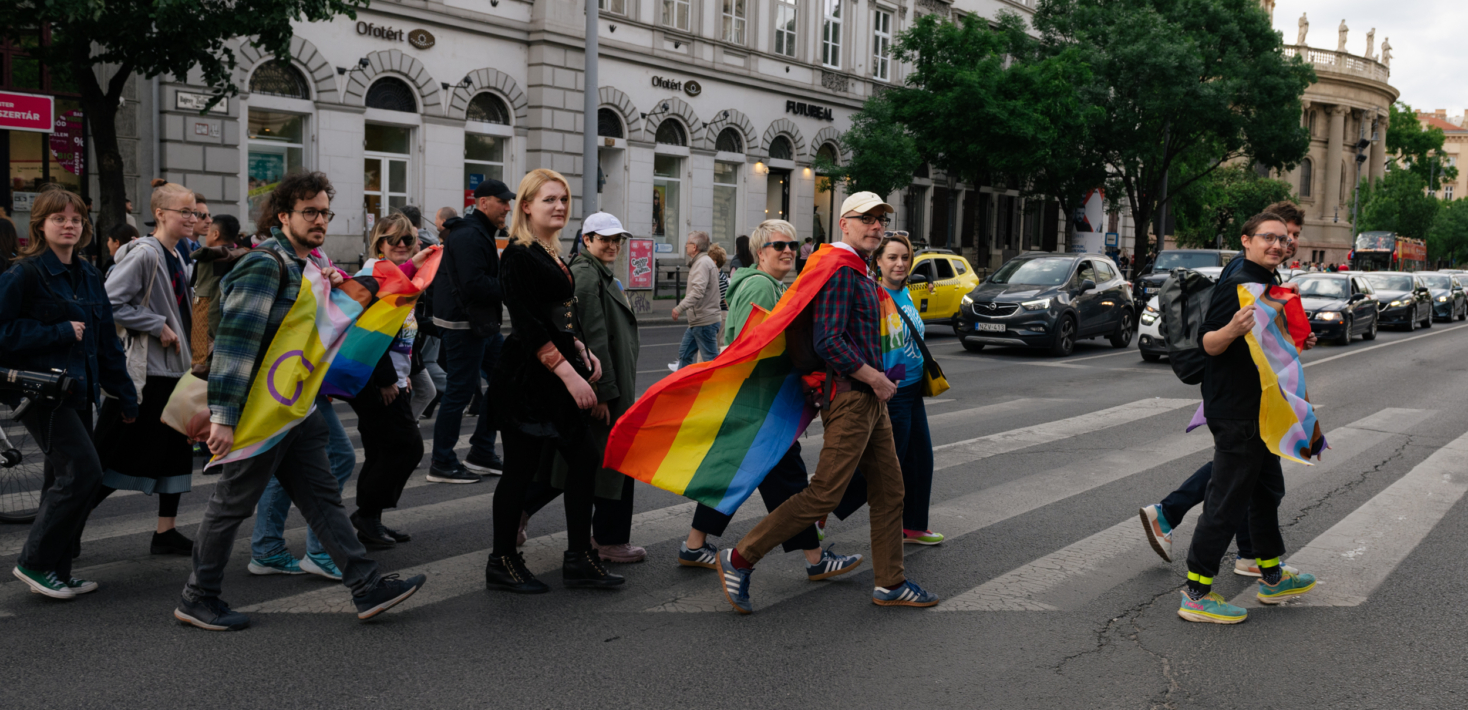Press release of Amnesty International Hungary, Háttér Society, Hungarian Helsinki Committee, Rainbow Mission Foundation and the Hungarian Civil Liberties Union
On 26 May 2025, a formal decision by Budapest police to ban an LGBTQI march in Budapest on June 1 gave away the lie to the claim by Hungary’s EU minister, János Bóka, that “there is no such thing in Hungary as a Pride ban”, said Amnesty International Hungary, Háttér Society, Hungarian Helsinki Committee, Rainbow Mission Foundation (Budapest Pride’s foundation), and Hungarian Civil Liberties Union.
The police banned the event, citing the amendment passed in March that bans demonstrations that display homosexuality or sexual diversity as “violating the rights of children”. As required by law, the organisers of the protest had notified the police of the planned rally on May 24. The reasoning behind the ban was that the demonstration was similar to the “previously established Pride schedule and forms of expression.”
“The aim of the demonstration is to speak up against the prevalent trans- and homophobia, to stand up for equal rights for the LGBTQI community and to draw attention to the fact that the infamous Section 33 outlawed legal gender recognition for trans people five years ago.”
The organizations have indicated in advance that the march will be peaceful, its aim is solely to raise awareness of the rights of LGBTQI people and to stand up for equality. The decision illustrates how arbitrary the application of the law is: the newly introduced restriction on the freedom of assembly aims to silence people and communities arbitrarily selected by the government and only allows public discourse on matters condoned by the ruling majority.
“By banning the event, the state discriminatorily restricts one of the most fundamental democratic rights: the right to peaceful assembly and freedom of expression. The decision implies that any kind of assembly can be held, except those that remind the police of the Pride March. What considerations are weighed in the decision-making, it is unknown. Such blatant arbitrariness by the authorities puts us all at risk, regardless of sexual orientation or gender identity, as they can now ban any community or opinion that the government finds uncomfortable for political reasons under the guise of ‘child protection’ – without any legal or scientific justification.”
“As human rights organizations, we work for the freedom of all of us and for a country where everyone can live safely. Amnesty International Hungary, Háttér Society, Hungarian Helsinki Committee, Rainbow Mission Foundation and the Hungarian Civil Liberties Union will not rest: we will challenge the police decision in court and will work with even more vigour to push the case forward, which could be the first step to getting the law, known as the “Pride ban”, struck down in national or international courts. Either way, Budapest Pride will happen. We believe that this case will pave the way for it, and everything can go back to the old 30-year tradition, which is marked by constructive cooperation between the organisers and the police.”
“Monday’s decision will not discourage the organisers of the Budapest Pride march: the march will be held, it will be bigger than ever. Indeed, it is precisely this case that allows us to develop the legal arguments that can defend Budapest Pride. Let us stand together for a free, equal and safe country for all and meet on 28 June at the Budapest Pride march!”
Background
On February 22, 2025, during his annual state of the nation address, Hungarian Prime Minister Viktor Orbán declared that “the Pride organisers should not bother preparing this year’s parade.” Less than a month later, on March 18, the Hungarian Parliament adopted a new anti-Pride law that allows to ban assemblies which contravene the 2021 anti-LGBTQI Propaganda Law, i.e. the prohibition the depiction and promotion of “divergence from self-identity corresponding to sex at birth, sex change or homosexuality” to people under 18. In addition to the Act on the right to assembly, the anti-Pride law also amended other pieces of legislation. Attendants of a banned protest risk a fine up to EUR 500. Authorities are now empowered to deploy facial recognition technology against all suspected offenders of petty offences, including those participating in a banned assembly, which is a sweeping expansion from its previous use.
On April 14, 2025, the Hungarian Parliament passed the 15th Amendment to the Fundamental Law, which was signed into law and published on the same day. The omnibus amendment redefines the constitutional hierarchy of fundamental rights by giving primacy, after the right to life, to the child’s right to protection and moral development. The fact that in case of concurrence, the right of the child prevails over every other fundamental right except for the right to life provides a constitutional basis for banning assemblies that are claimed to be “violating children’s rights.”
These legislative changes occurred amid the ongoing infringement proceeding at the Court of Justice of the European Union concerning Hungary’s anti-LGBTQI laws, notably the pending case C-769/22 (Commission v Hungary). Although the amendments entered into force in April 2025, this is the first time the police have used the anti-Pride law to ban a public assembly that supports LGBTQI equality.It is an almost incomprehensible contradiction that only a few days earlier, on May 17, the police had not only taken note of but also secured the holding of an LGBTQI rights demonstration, organized by the same organizations with almost the same aims. It is clear that the current decision was arbitrary, the police banned the planned march for political reasons.
